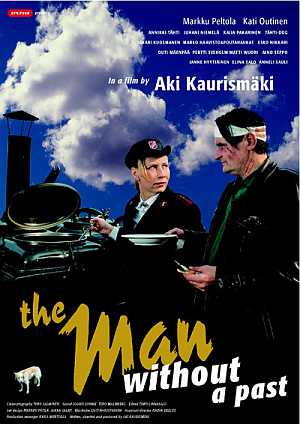A man comes by nighttrain to Helsinki. As he sleeps on a park bench, three hoodlums beat him repeatedly about the head with a baseball bat and steal his suitcase. After being pronounced dead at the hospital, the man recovers, but has completely lost all memory of who he was.
In 'The Man Without A Past', Aki Kaurismaki takes this opening premise, familiar from countless amnesiac thrillers (except perhaps the bit about Helsinki), and weaves from it a black comedy of social exclusion and personal redemption. For M (played by Harry Dean Stanton lookalike Markku Peltola) is quickly confronted with a bureaucratic edifice designed to marginalise those who have neither finances nor official identity. Yet M finds acceptance with Salvation Army worker Irma (played by Kaurismaki regular Kati Outinen), entrepreneurial security guard Anttila (Sakari Kuosmanen), his dog Hannibal, and a whole underclass of the dispossessed.
M's past, when it finally catches up with him, is almost an irrelevance, for Kaurismaki's film is really concerned with the possibility of wiping the slate clean and replacing globalised, corporate living with the values of a utopian community of barter and free association. What we have here is a political allegory for our times, in which big business and the apparatus of capitalism are shown as dehumanising forces of evil. It is also, of course, very funny.
Fans of Kaurismaki will not be disappointed by the usual deadpan dialogue and understated performances. Yet in something of a break with his own past, here Kaurismaki employs a rich technicolor palette, giving his world of lowlifes and down-and-outs the look of a film from the 1950s, via David Lynch - which only adds to the impression that the film is more postmodern fairytale than thriller.
Probably not the most memorable of amnesiac films, but a thoroughly entertaining piece of downbeat comedy.
In 'The Man Without A Past', Aki Kaurismaki takes this opening premise, familiar from countless amnesiac thrillers (except perhaps the bit about Helsinki), and weaves from it a black comedy of social exclusion and personal redemption. For M (played by Harry Dean Stanton lookalike Markku Peltola) is quickly confronted with a bureaucratic edifice designed to marginalise those who have neither finances nor official identity. Yet M finds acceptance with Salvation Army worker Irma (played by Kaurismaki regular Kati Outinen), entrepreneurial security guard Anttila (Sakari Kuosmanen), his dog Hannibal, and a whole underclass of the dispossessed.
M's past, when it finally catches up with him, is almost an irrelevance, for Kaurismaki's film is really concerned with the possibility of wiping the slate clean and replacing globalised, corporate living with the values of a utopian community of barter and free association. What we have here is a political allegory for our times, in which big business and the apparatus of capitalism are shown as dehumanising forces of evil. It is also, of course, very funny.
Fans of Kaurismaki will not be disappointed by the usual deadpan dialogue and understated performances. Yet in something of a break with his own past, here Kaurismaki employs a rich technicolor palette, giving his world of lowlifes and down-and-outs the look of a film from the 1950s, via David Lynch - which only adds to the impression that the film is more postmodern fairytale than thriller.
Probably not the most memorable of amnesiac films, but a thoroughly entertaining piece of downbeat comedy.




